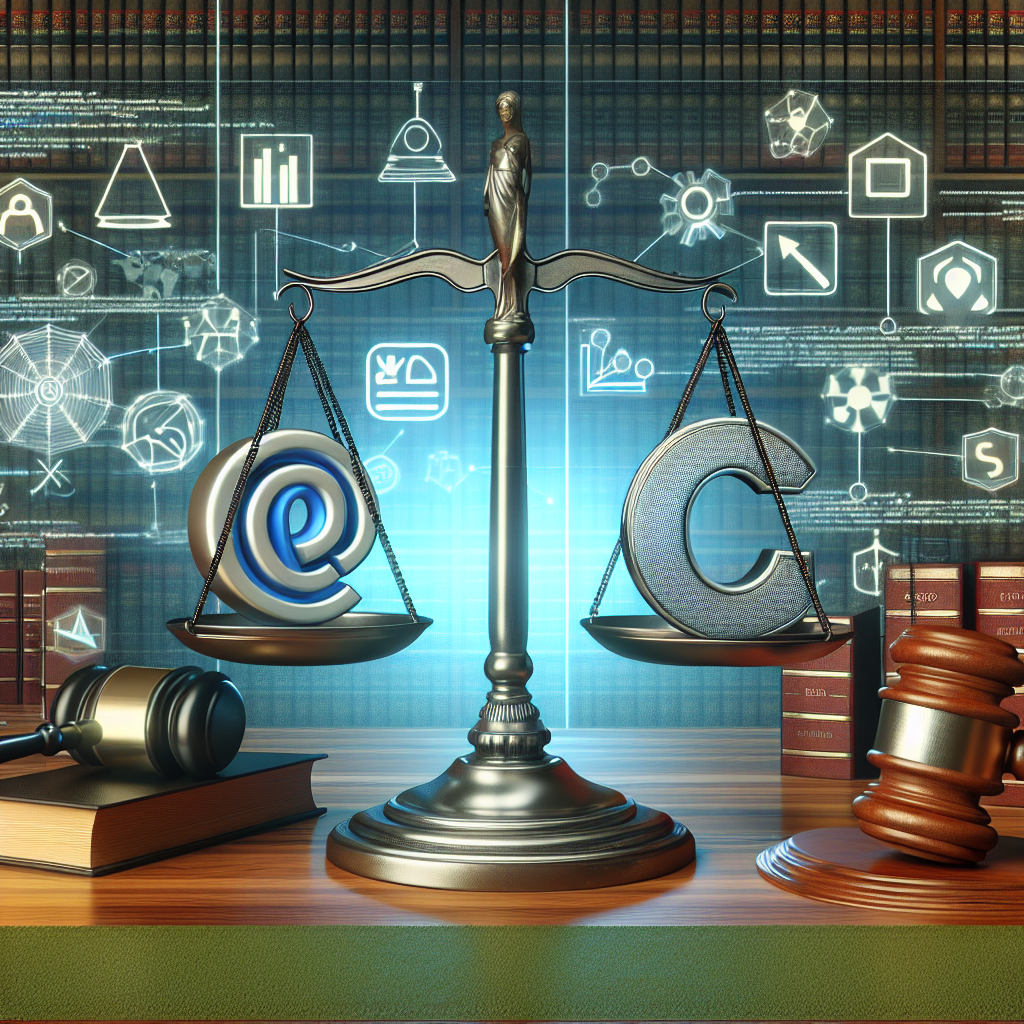Exploring the Ethical Dilemmas of Using Programmatic SEO in Legal Practices
The legal landscape is changing faster than you can say “objection,” and with it, the ways law firms approach their digital marketing strategies. Enter the world of programmatic SEO for law firms, where algorithms take the wheel and lawyers can sit back while their websites churn out optimized content. It sounds like a dream come true, doesn’t it? But before we all break out into a celebratory dance, let’s take a moment to ponder: what ethical dilemmas might this automated strategy bring to our doorsteps?
While data-driven SEO strategies for law firms hold the potential for higher visibility and engagement, they also raise important ethical questions that can make even the most stalwart attorney uneasy. For instance, what happens when your AI-driven SEO for law firms starts prioritizing rankings over accuracy? Or worse, when it inadvertently creates misleading content that could jeopardize your reputation? After all, as our wise colleagues have long reminded us: “A good reputation is more valuable than money.”
- Transparency vs. Automation: How transparent should you be about the use of automated tools in your marketing strategy?
- Quality vs. Quantity: Are you willing to sacrifice quality legal advice for mere online visibility?
- Accountability: Who’s liable when AI-generated content misrepresents your practice or attracts unethical clientele?
Research shows that local search results are three times more likely to result in a visit than non-local searches (BrightLocal). This statistic underscores the importance of maintaining not just visibility but also integrity in your digital presence. As you embrace automated SEO for lawyers, you’ll want to ensure that you’re doing so in a way that aligns with both legal standards and ethical obligations.
Striking the Right Balance
The challenge here lies in finding that sweet spot where technology meets ethical considerations. Think of it as navigating through an intricate maze—one wrong turn could lead to an ethical pitfall or worse, a public relations disaster.
Your digital marketing partner should be attuned to these complexities, helping you implement law firm digital marketing strategies that not only boost your online presence but also safeguard your firm’s reputation. Remember: programmatic marketing for law firms is about enhancing your reach without compromising your principles.
“In law as in life, there are no shortcuts worth taking.” – Unknown
The journey towards effective and ethical SEO solutions for the legal industry is not one to be taken lightly. As we delve deeper into this topic throughout our post, let’s keep our moral compasses calibrated—because at the end of the day, it’s about building trust with clients while ensuring compliance with industry standards.
The Rise of Programmatic SEO in Law Firms
As the digital realm continues to evolve, so too does the concept of programmatic SEO for law firms. This innovative approach allows attorneys to automate various aspects of their online marketing, making it easier to scale their efforts and reach a broader audience. With the rise of AI tools and data analytics, it’s no surprise that firms are turning their eyes toward scalable SEO solutions that promise efficiency and increased visibility.
According to recent studies, approximately 68% of online experiences begin with a search engine. That’s right—if you’re not showing up when potential clients are looking for legal help, you’re effectively shouting into a void. The demand for effective legal industry search engine optimization has never been greater. This is where programmatic SEO can shine, offering dynamic solutions tailored specifically for legal practices.
The Mechanics Behind Programmatic SEO
Let’s break it down: programmatic SEO utilizes algorithms to analyze vast amounts of data, enabling law firms to create content that resonates with their target audience. Picture this: instead of spending countless hours brainstorming topics or painstakingly optimizing each page on your website, an automated system can help identify trending keywords and craft content designed for optimal engagement.
- Automated Keyword Research: Tools now exist that can perform exhaustive keyword research much faster than any human could dream of doing. This allows you to stay ahead in a competitive market.
- Content Generation: With advancements in content creation technology, programmatically optimized legal sites can generate articles on relevant topics without sacrificing quality—well, most of the time!
- A/B Testing: Want to know which headlines attract more clicks? Automated systems can test various versions quickly and efficiently.
This might sound like sorcery (or at least a well-funded tech startup), but it’s happening right now in law firm digital marketing. However, tread carefully: while embracing these advanced SEO techniques for attorneys can lead to substantial benefits, they also open the door to ethical considerations that cannot be ignored.
Adapting to Change
The legal landscape is notorious for its rigidity; however, it is essential that law firms adapt if they wish to remain competitive in an increasingly digital world. A staggering 76% of people who search for something local on their smartphone visit a business within 24 hours (Think with Google). This statistic highlights the opportunity waiting at your fingertips when you invest in effective search optimization for legal practices.
If you haven’t yet embraced AI-driven SEO for law firms, it might be time to reassess your strategy. However, remember: just because you *can* automate doesn’t mean you *should* cut corners on ethics or quality. The goal should always be about creating genuine connections with potential clients while presenting accurate information about your services.
“Innovation distinguishes between a leader and a follower.” – Steve Jobs
The rise of programmatic SEO presents both opportunities and challenges—a balancing act that requires foresight and diligence from law firm partners who wish to navigate this brave new digital world successfully.
Understanding the Ethical Challenges
When it comes to programmatic SEO for law firms, the ethical challenges are as tangled as your average courtroom drama. Sure, the allure of automated SEO for lawyers is compelling, but let’s dig into the moral quandaries that surface when algorithms start calling the shots.
Data Integrity and Authenticity
First off, we must grapple with data integrity. In a world where facts can get lost in translation, how do you ensure that the information being generated is not only accurate but also reflective of your firm’s values? The fine line between utilizing data analytics and misrepresenting your services can often look more like a tightrope walk. Are you ready to risk a fall?
- Algorithmic Bias: Algorithms are only as good as the data fed into them. If that data is biased or incomplete, your content could inadvertently perpetuate misinformation. Yikes!
- Content Authenticity: Automated content creation for lawyers may produce engaging articles, but will they resonate on a human level? Your clients want to connect with real people, not bots armed with statistics.
The Transparency Tightrope
Next up is transparency—or, shall we say, the transparency tightrope. As you navigate the waters of AI-driven SEO for law firms, how transparent should you be about your tools and methods? Clients nowadays appreciate honesty; they want to know who they’re dealing with beyond just legal expertise.
- Disclosure Dilemmas: Do you disclose that certain sections of your site are powered by automated systems? Or do you let it slide under the radar like an undisclosed conflict of interest? Spoiler alert: clients tend to appreciate transparency.
- User Trust: Maintaining trust is crucial in any client relationship. Misleading tactics could lead to potential fallout akin to dropping a bombshell in an otherwise civil case.
The Accountability Conundrum
Finally, there’s accountability. In our increasingly digital world, who takes responsibility if AI-generated content leads clients astray? Would it be the software developers? The marketing agency? Or will it land squarely on your shoulders as the managing partner?
- Pitfalls Ahead: Prepare for some ethical dilemmas when it comes to liability. If that blog post about personal injury law contains inaccuracies due to automated processes, will you face backlash?
- Your Reputation at Stake: Remember, reputation is everything in this field—lose it and you’re left scrambling like a lawyer facing an unexpected deposition.
The crux of the matter is this: while programmatic SEO can streamline your processes and elevate your online presence, understanding these ethical challenges will arm you against future pitfalls. After all, maintaining a respectable digital footprint isn’t just about being found; it’s about being found *for* all the right reasons.
“In today’s world, trust can be built or broken faster than ever before.” – Unknown
The landscape of legal marketing is evolving; so too should our approach towards ethics in this brave new world. Balancing innovation with integrity might feel daunting—but when done right, it not only enhances your firm’s reputation but also contributes positively to the legal profession as a whole.
Balancing Innovation with Professional Responsibility
Ah, the age-old struggle: how do we embrace innovation without throwing our professional responsibilities out the window? As law firms increasingly turn to programmatic SEO for law firms, this question looms larger than ever. The truth is, navigating this digital labyrinth requires not just technical acumen but a solid moral compass.
The Ethical Implications of Automation
With the automation of SEO tasks comes a double-edged sword. Sure, AI-driven tools can help you scale your content efforts, but they also bring forth ethical implications that deserve serious consideration. After all, it’s easy to get swept up in the promise of automated keyword research or content generation, but how often do you pause to think about the potential fallout?
- Responsibility for Content Quality: When digital algorithms take over your content strategy, who is ultimately responsible for what gets published? Is it the tech developers or your law firm? It’s worth contemplating whether you’re willing to stake your reputation on something churned out by an algorithm.
- The Human Touch: While programs can craft sentences that are grammatically correct, they often lack the nuance and empathy that only human writers possess. Would you want an AI to represent you in court? Probably not.
Navigating Client Interactions
Your clients deserve to know they’re engaging with professionals who uphold integrity and accountability—qualities that can’t be coded into a machine. Transparency about how much of your content is automated could play a pivotal role in building trust.
- Setting Expectations: Be upfront with clients regarding your use of technology in marketing. Let them know if they’re reading AI-generated articles versus those penned by actual lawyers. Misleading clients will only lead to backlash—and nobody enjoys being on the receiving end of a disgruntled review.
- Cultivating Genuine Relationships: In an industry built on personal connections, remember that authenticity reigns supreme. Automated systems can help with efficiency, but genuine human interactions remain irreplaceable.
“Technology is best when it brings people together.” – Matt Mullenweg
The Path Forward: A Balanced Approach
The key takeaway here is balance. Embracing advanced law firm SEO strategies, such as programmatic marketing for law firms, should not mean relinquishing control over quality or ethical standards. Instead, think of technology as a tool—one that should complement rather than replace your core values as legal professionals.
In conclusion, while innovation drives our industry forward at breakneck speed, maintaining accountability and transparency will ensure you’re not just another faceless entity in cyberspace. As we continue exploring the fascinating world of legal industry search engine optimization, let’s remember: it’s about more than just clicks; it’s about serving clients with dignity and respect.
Case Studies: Programmatic Marketing in Action
To truly appreciate the impact of programmatic SEO for law firms, let’s dive into some real-world case studies that showcase this strategy in action. Buckle up, because these stories could hold the keys to elevating your firm’s digital marketing game—or at least provide a few anecdotes for the next water cooler chat.
Case Study 1: The Small Firm That Could
Imagine a small family law firm in a bustling city. They had been struggling with law firm digital marketing and their online visibility was about as noticeable as a mime in a dark alley. After implementing programmatic SEO tactics, they saw an astonishing 45% increase in organic traffic within just three months. How did they do it? Their strategy involved:
- Automated Content Creation: The firm employed automated tools to generate relevant articles on topics like custody battles and divorce mediation—content that resonated with their local audience.
- A/B Testing: By testing various headlines and calls-to-action, they identified which messages attracted potential clients most effectively.
This approach not only bolstered traffic but also garnered high engagement rates, proving that even small firms can leverage advanced techniques for substantial results.
Case Study 2: The Niche Specialist
A specialized intellectual property law firm decided to harness AI-driven SEO for law firms. They recognized the importance of targeting specific keywords associated with patent law—a niche that had relatively low competition at the time. Their tactical moves included:
- Keyword Optimization: Utilizing automated keyword research tools, they pinpointed long-tail keywords that potential clients were searching for but competitors had overlooked.
- Dynamic FAQ Pages: They created programmatically optimized FAQ pages addressing common client queries, enhancing user experience while boosting search rankings.
The result? A whopping 60% increase in inquiries related to patent filings within six months! This case underscores the power of targeted strategies combined with automation—an ideal recipe for success in a competitive field.
The Key Takeaway
No doubt about it—these firms have successfully navigated the waters of programmatic marketing, proving that automation doesn’t equate to losing the human touch; rather, it can enhance connections when executed thoughtfully. However, let’s not forget the underlying principle: while metrics and algorithms drive results, maintaining ethical standards is crucial. After all, a flashy website won’t save you from an unethical reputation!
“Success is not just about what you accomplish in your life; it’s about what you inspire others to do.” – Unknown
The case studies illustrate a pivotal lesson: as you contemplate adopting these methodologies yourself, think critically about how to incorporate ethics into your own strategies. Remember, amidst all those clicks and conversions lies your firm’s integrity—and that’s something no algorithm can replicate.
Navigating Legal Industry Search Engine Optimization Ethically
Navigating the murky waters of legal industry search engine optimization isn’t just about getting clicks; it’s a matter of doing so ethically. As law firms increasingly adopt programmatic SEO for law firms, the stakes are higher than just traffic numbers or search rankings. With great power comes great responsibility, and in this case, that responsibility isn’t just to yourself but to your clients and the legal profession as a whole.
Prioritizing Ethics Over Estimates
When you sit down with your marketing partner and discuss automated SEO for lawyers, it’s crucial to keep ethics at the forefront. Just because a tool can promise you the moon (or at least the first page of Google) doesn’t mean you should blindly trust it. Consider these ethical considerations:
- Accuracy Matters: Ensure that the content generated is not just algorithmically optimized but also factually correct. Misleading information could not only damage your reputation but also lead to potential legal ramifications.
- Relevance is Key: The automated tools you employ should produce content that genuinely addresses your audience’s needs—not mere keyword stuffing for the sake of rankings.
The Human Element in an Automated World
No matter how sophisticated your automated systems may be, they lack one critical element: humanity. Your clients seek representation from real people, not soulless algorithms. While programmatically optimized legal sites can produce engaging content, consider infusing human perspectives into your digital presence:
- Add Personalized Touches: Collaborate with writers who can add depth and perspective to the automated content produced by lawyer SEO tools. A sprinkle of human insight can turn a bland article into something relatable and genuine.
- Acknowledge the Limitations: Be transparent with clients about what parts of your online presence are automated versus crafted by professionals. Consistently maintaining this honesty builds trust—a currency far more valuable than any fleeting click-through rate.
Sustaining Client Trust Through Transparency
The bedrock of a successful law practice lies in client trust. In an age where more than half of all searches are voice-activated (Statista), ensuring that clients feel heard is paramount. Here’s how to maintain that vital trust as you implement SEO automation for attorneys:
- Open Communication Channels: Regularly update clients on how you’re utilizing technology in your marketing strategies without alienating them with jargon they may not understand.
- Crisis Management Skills: Prepare for potential pitfalls arising from miscommunicated AI-generated content by having strategies in place for addressing issues swiftly and transparently.
“Trust is built with consistency.” – Lincoln Chafee
The bottom line? Navigating ethical dilemmas in programmatic SEO requires both vigilance and integrity. As law firms explore these innovative marketing strategies, it’s essential to remember that while technology can amplify your reach, it should never overshadow the fundamental principles that define our profession: honesty, transparency, and respect for our clients’ needs.
Your digital presence should reflect not only who you are as a firm but also what you stand for—because ultimately, it’s about more than just clicks; it’s about cultivating lasting relationships built on trust.
The Future of AI-Driven SEO for Law Firms: A Cautious Approach
As we look ahead, the future of AI-driven SEO for law firms is a landscape filled with promise and peril. The question, however, is whether we should rush headlong into this brave new world or step cautiously, keeping our ethical compass firmly in hand. After all, just because AI can do something doesn’t mean it should—much like wearing socks with sandals.
Balancing Efficiency with Integrity
The efficiency gained from automated SEO for lawyers can be staggering. Imagine reducing hours spent on keyword research to mere minutes! But let’s pause and reflect: what about the integrity of the content being produced? Algorithms may excel at identifying trends, but does that ensure the authenticity your clients crave? The answer is, unsurprisingly, a resounding “no.”
- Human Oversight Needed: Every piece of content generated through AI needs a human touch—someone who can evaluate its tone, relevance, and accuracy before it sees the light of day.
- Content Personalization: Clients want to connect with real experiences and emotions. Automated tools may fall short in creating personalized narratives that resonate on a deeper level.
The Ethical Implications of Dependency
The dependency on programmatic systems could lead to a slippery slope where firms prioritize speed over substance. Consider this: if your firm is only focused on ranking high due to sheer volume rather than quality legal insight, what becomes of your brand’s reputation? A flashy website devoid of meaningful engagement is like a well-decorated ship with no passengers—it looks great but serves no purpose.
A study conducted by HubSpot found that companies prioritizing customer experience have achieved 80% higher revenue growth than their competitors. With this in mind, wouldn’t it be wise to invest as much in the quality of interactions as you do in the quantity?
Evolving Client Expectations
Your clients are smarter than ever; they demand authenticity and transparency. As more than half of all searches are now voice-activated (source), it’s crucial for your digital marketing strategy to adapt accordingly. This means delivering not just answers but genuine insight that reflects your firm’s expertise and values.
- Building Relationships: Prioritize fostering relationships over algorithms. Invest time in understanding client needs rather than churning out generic content that fails to address their concerns.
- Evolving Ethics: As AI Regularly review how these tools impact your brand image and client perception.
“The best way to predict the future is to create it.” – Peter Drucker
The bottom line? As you explore the frontier of programmatic SEO for law firms, remain vigilant against the dangers posed by negligence toward ethics in your digital strategy. Embrace innovation—but do so with caution, ensuring each step taken enhances both efficiency and integrity while upholding the values upon which your practice stands.






